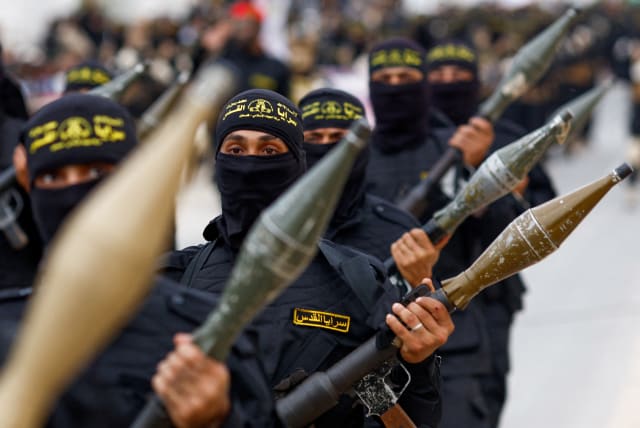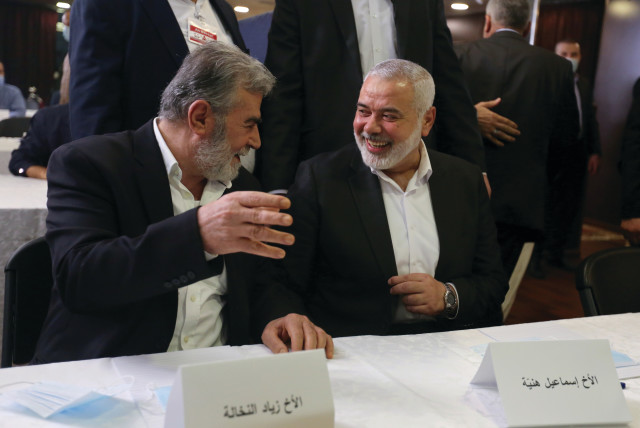Palestinian Islamic Jihad calls for Ramadan to be 'month of terror’ - analysis

The PIJ comments are also linked to those made by Hamas leader Ismail Haniyeh, who has called for escalation during Ramadan.
Palestinian Islamic Jihad is calling for Ramadan to be a “month of terror” and seeks to escalate attacks in the West Bank and Gaza. In a recent speech, Abu Hamza, the spokesman for PIJ’s Al-Quds Brigades, said he wants Arab countries in the region and pro-Iranian groups to continue to “unify” various arenas and fronts against Israel.
This is the latest indication that terrorist groups plan to seek an escalation in hostilities over the next month. Hamza’s remarks were published by Beirut-based Al Mayadeen news channel, which is pro-Iranian and frequently highlights Hamas and Hezbollah attacks.This comes amid some hope for a hostage, prisoner, and ceasefire deal between Israel and Hamas. The US is pushing for such a deal. But Hamas has continued to make it difficult by refusing to hand over a list of names of the living hostages.
Palestinian Islamic Jihad is a proxy of Iran. It has armed men in Gaza and the West Bank, and its leaders often reside in Damascus, where they sometimes leave to meet with their Iranian handlers in Tehran or to coordinate with Hamas and Hezbollah.
'Unity of the battlefields'
The terminology used by PIJ ahead of Ramadan is part of the terminology Iran has used over the years to describe its strategy against Israel. This includes references to “unity of the battlefields,” which is a term for “unity of the arenas” or “unity of the fronts.”
These arenas include Iranian-backed groups in Lebanon, Syria, Iraq, and Yemen. Iran has sought to surround Israel with threats that now exist along an arc of 5,000 miles, from Lebanon via Syria and Iraq to the Red Sea and then back to Gaza.There are at least seven different “fronts,” according to Iran. Israeli officials have also mentioned these fronts. Iran wants to “unify” them. This means using the Hamas massacre on October 7 to increase attacks from Hezbollah and Iranian-backed groups in Syria and Iraq.Although PIJ is one of the smallest of Iran’s proxies, it is still a menace. It has carried out attacks in Gaza and during the pause in fighting in late November. It has held hostages in Gaza, and its members played a role in the hostage releases.The group has stockpiled thousands of rockets in the Gaza Strip. In the West Bank, PIJ stockpiles M-16-style rifles, with many of them stolen and trafficked in recent years.
PIJ is now calling on groups in Arab countries to not “lag in the battle led by the heroes of the resistance in the Gaza Strip, on behalf of the Islamic nation, especially those who possess armies, planes, and cannons.”It’s not clear what countries Hamza thinks would now join and back Hamas. However, he is trying to shame the neighboring states.“Isn’t it time for you to raise your guns like the free people in Yemen, Lebanon, and Iraq?” Hamza asked. “Isn’t it time for you to take off the garment of slavery and humiliation to America, the Great Satan, and follow the example of the honorable?”PIJ has praised the Palestinian terrorists continuing to fight in Gaza. In recent days, the group’s members have carried out attacks in the Zeitoun neighborhood near Gaza City, Hamza said. The IDF has been operating in that area over the last two weeks, seeking to clear it of terrorists.Hamza also called for attacks on “the occupation’s military checkpoints” and to “cut off the road to the settlers.” The first day of Ramadan should become an international day to support Gaza and “mobilize” in “all the arenas,” he said.This appears to indicate that Iran is plotting to escalate during Ramadan. The West wants a ceasefire during Ramadan, but it has historically been the month used by terrorists and extremists as an excuse to increase attacks.“We are certain that the single body of the nation will do the impossible and will make the month of Ramadan historic days to wash away shame and threaten the existence of the Israeli enemy entity and global arrogance,” Hamza said.The terrorist group’s comments are also linked to those made by Hamas leader Ismail Haniyeh, who has called for an escalation of hostilities during Ramadan.
Jerusalem Post Store
`; document.getElementById("linkPremium").innerHTML = cont; var divWithLink = document.getElementById("premium-link"); if (divWithLink !== null && divWithLink !== 'undefined') { divWithLink.style.border = "solid 1px #cb0f3e"; divWithLink.style.textAlign = "center"; divWithLink.style.marginBottom = "15px"; divWithLink.style.marginTop = "15px"; divWithLink.style.width = "100%"; divWithLink.style.backgroundColor = "#122952"; divWithLink.style.color = "#ffffff"; divWithLink.style.lineHeight = "1.5"; } } (function (v, i) { });

